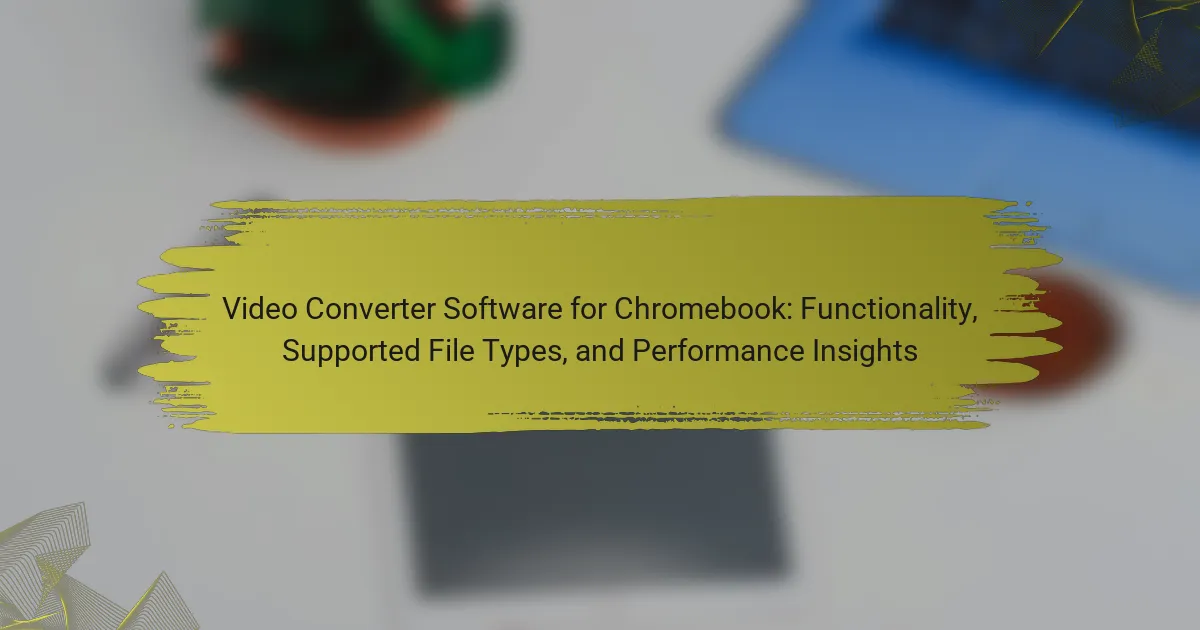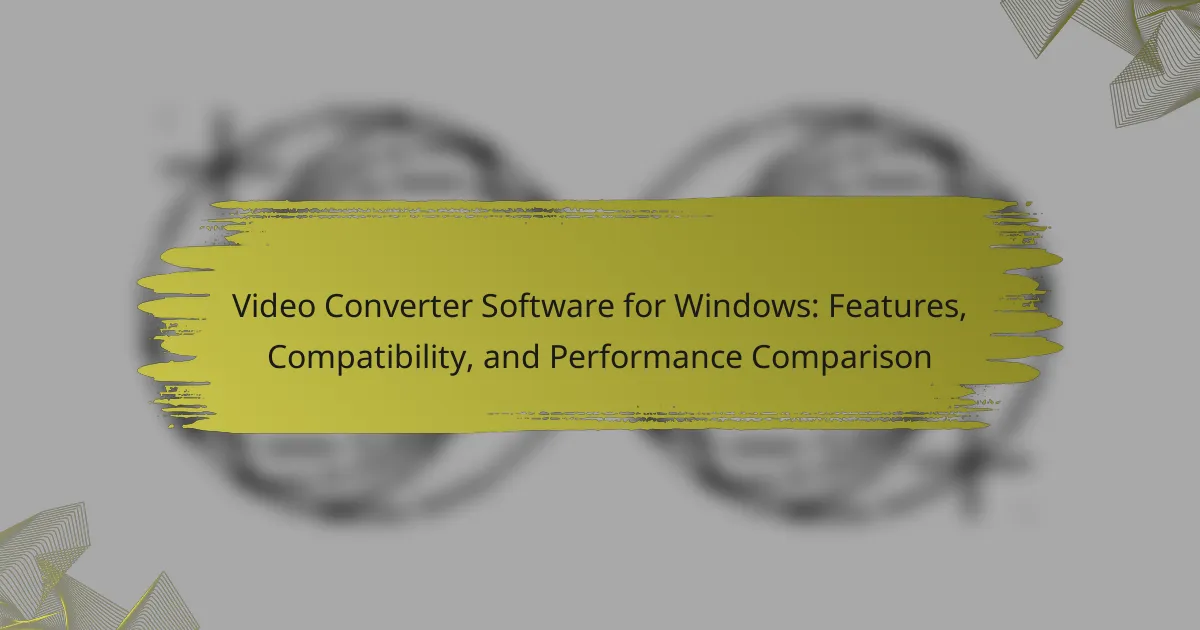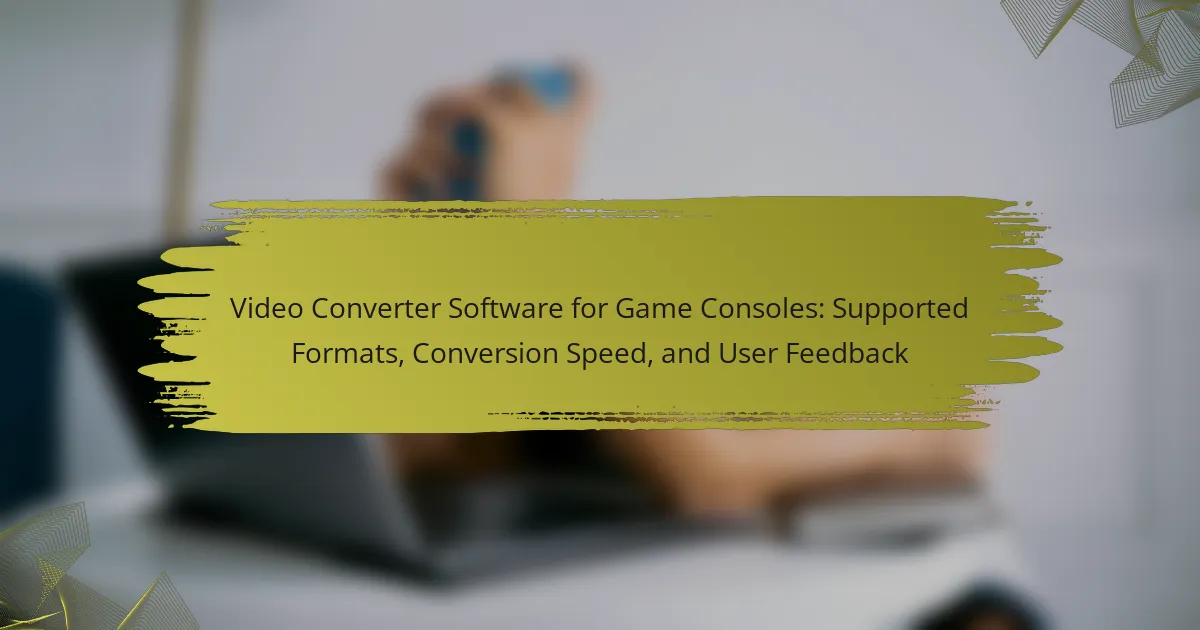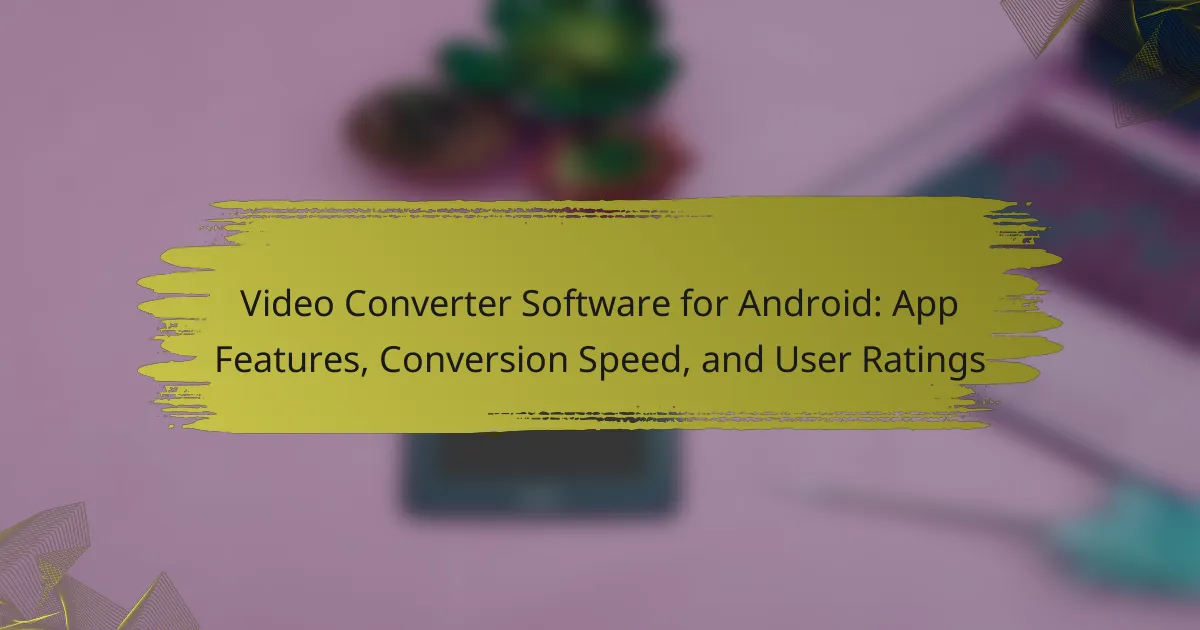Video converter software for Chromebook is a specialized tool designed to convert video files into various formats compatible with Chrome OS. This software supports common formats such as MP4, AVI, MOV, and MKV, along with audio formats like MP3 and AAC, and even image formats for video thumbnails. Key features often include batch conversion and editing options, with many tools operating in the cloud for enhanced performance and accessibility. User reviews indicate that these converters are efficient for basic file conversions, providing satisfactory output quality while minimizing the strain on Chromebook hardware. This article provides insights into the functionality, supported file types, and performance characteristics of video converter software for Chromebook.

What is Video Converter Software for Chromebook?
Video converter software for Chromebook is a tool that allows users to convert video files into different formats. This software is specifically designed to be compatible with the Chrome OS environment. Users can easily change video formats to suit various devices or applications. Common formats supported include MP4, AVI, and MOV. The software typically offers features like batch conversion and editing options. Many video converters for Chromebook operate directly in the cloud, enhancing accessibility. Some popular options include online converters and Chrome extensions. These tools provide a convenient solution for users needing video format compatibility on their Chromebooks.
How does Video Converter Software function on a Chromebook?
Video converter software functions on a Chromebook by utilizing web-based applications or Android apps. These applications allow users to upload video files and select desired output formats. The software processes the videos through cloud computing, which is efficient for Chromebooks with limited local processing power. Users can typically convert files to formats like MP4, AVI, or MOV. Most web-based converters require an internet connection to function effectively. Additionally, the software often provides options for adjusting resolution and bitrate. This functionality is supported by the Chromebook’s ability to run Android apps from the Google Play Store.
What are the key features of Video Converter Software for Chromebook?
Key features of Video Converter Software for Chromebook include user-friendly interfaces, support for various file formats, and fast conversion speeds. These software options often allow batch processing, enabling multiple files to be converted simultaneously. Many tools provide options for adjusting video quality and resolution. Additionally, they may include editing features such as trimming and merging videos. Compatibility with cloud storage services is also common, facilitating easy file access. Many converters offer presets for popular devices, simplifying the conversion process. Lastly, some software provides a free version with limited features, allowing users to test functionality before purchasing.
How does the user interface impact usability on a Chromebook?
The user interface significantly impacts usability on a Chromebook. A well-designed interface enhances user experience by making navigation intuitive. Chromebook interfaces prioritize simplicity and accessibility. This allows users to easily locate applications and settings. Clear icons and a streamlined layout reduce confusion. Touchscreen capabilities further enhance interaction, especially for mobile users. Research shows that user satisfaction increases with effective interface design. A study by Nielsen Norman Group indicates that usability improves with user-friendly layouts.
What are the advantages of using Video Converter Software on a Chromebook?
Video converter software on a Chromebook offers several advantages. It allows users to convert various video formats efficiently. This software typically supports a wide range of file types, enhancing compatibility with different devices. Users can easily adapt videos for streaming or playback on specific platforms. Many video converter applications are optimized for Chromebook’s hardware, ensuring smooth performance. Additionally, these tools often come with user-friendly interfaces, making them accessible for all skill levels. They may also include features like batch processing, saving time when converting multiple files. Overall, video converter software enhances the versatility of media management on Chromebooks.
How does it enhance multimedia experiences for users?
Video converter software enhances multimedia experiences for users by facilitating the transformation of video files into various formats. This allows users to play videos on different devices without compatibility issues. The software often supports multiple file types, ensuring versatility in media consumption. Users can also optimize video quality and file size, improving playback performance. Additionally, many converters offer features like batch processing, saving time and effort in managing multiple files. This functionality is crucial for users who require specific formats for editing or sharing. Overall, video converter software significantly enriches how users interact with multimedia content.
What specific use cases benefit from this software?
Video converter software for Chromebook benefits various use cases. Users can convert video files into different formats for compatibility. This is essential for viewing on different devices. The software allows for compression of large files. This helps in saving storage space on Chromebooks. It also enables editing features like trimming and merging videos. Users can enhance video quality through format conversion. Additionally, it supports batch processing, saving time for users with multiple files. These functionalities make it ideal for personal, educational, and professional use.
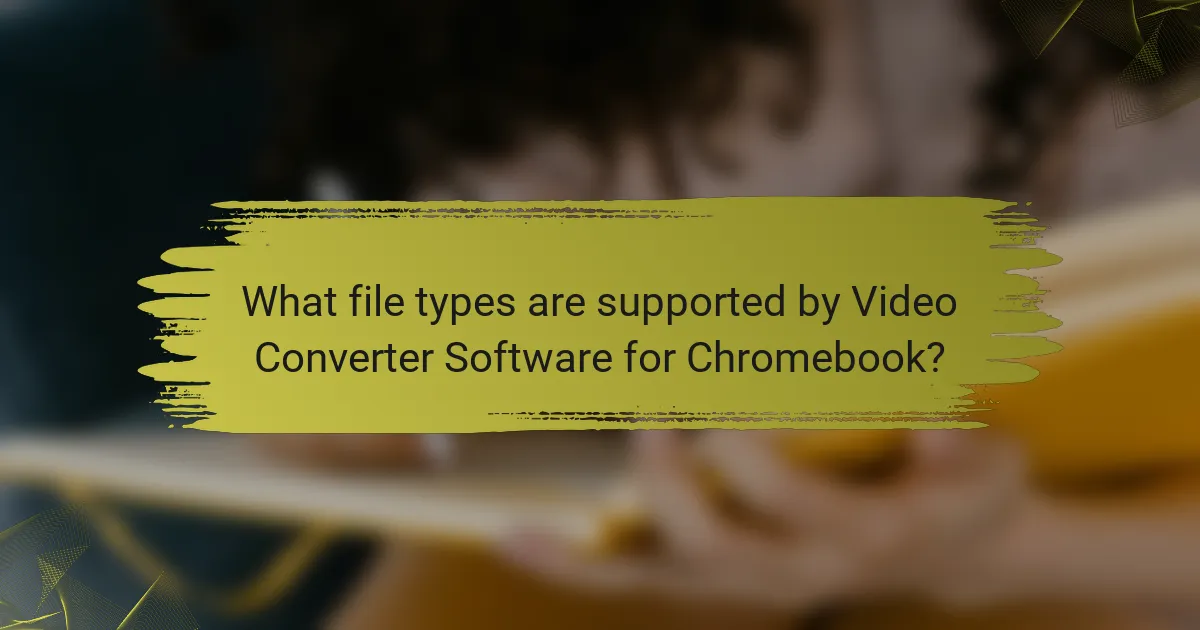
What file types are supported by Video Converter Software for Chromebook?
Video Converter Software for Chromebook supports various file types. Commonly supported formats include MP4, AVI, MOV, and MKV. Additionally, it may handle audio files like MP3 and AAC. Some software also supports image formats such as JPG and PNG for video thumbnails. The specific capabilities can vary by software version and developer. Users should check individual software specifications for detailed compatibility.
Which video formats can be converted using this software?
This software can convert various video formats including MP4, AVI, MOV, MKV, and WMV. These formats are widely used and supported across different devices. The software’s capability to handle these formats allows for versatile video editing and playback options. Users can easily convert files to their desired format for compatibility with specific devices or applications. The inclusion of popular formats like MP4 ensures a broad user base can benefit from its features.
What audio formats are compatible with Video Converter Software for Chromebook?
Video Converter Software for Chromebook typically supports audio formats such as MP3, WAV, AAC, FLAC, and OGG. These formats are widely used for audio playback and are compatible with various devices. MP3 is known for its compression and quality balance. WAV offers uncompressed audio quality. AAC is often used for streaming services. FLAC provides lossless compression for high-fidelity audio. OGG is an open-source format that is also widely accepted. Each of these formats can be converted using the software, ensuring versatility for users on Chromebook.
How does file type support vary among different software options?
File type support varies significantly among different video converter software options. Some software supports a wide range of formats, such as MP4, AVI, MOV, and MKV. Others may only handle a limited selection, like MP4 and AVI. The variation often depends on the software’s intended use and target audience. For example, professional-grade converters typically support more complex formats and codecs. In contrast, basic converters may focus on popular formats for casual users. Additionally, software updates can expand file type support over time. Users should check the specific supported formats listed by each software to ensure compatibility with their needs.
What are the limitations regarding file type conversions?
File type conversions have several limitations. Not all formats support the same features. For example, converting a video with multiple audio tracks may result in loss of some tracks. Some formats are lossy, meaning quality is sacrificed during conversion. Others may not support high resolutions or specific codecs. Additionally, certain file types may have restrictions on editing or playback after conversion. Compatibility issues can arise when transferring converted files to different devices. Lastly, the conversion process can be time-consuming, depending on file size and software efficiency.
Are there any specific formats that are not supported?
Certain formats are not supported by video converter software for Chromebook. Common unsupported formats include proprietary file types like .wmv and .mov. Additionally, some high-efficiency formats may also face compatibility issues. These limitations arise from the software’s design and the underlying operating system constraints. Users should check the software documentation for a complete list of supported and unsupported formats.
How can users overcome these limitations?
Users can overcome limitations of video converter software for Chromebook by selecting tools that offer extensive file type support. Choosing converters that are cloud-based can enhance processing power and speed. Utilizing software with batch processing capabilities allows users to convert multiple files simultaneously. Regularly updating the software ensures compatibility with the latest file formats. Users should also consider converters with user-friendly interfaces for easier navigation. Accessing online tutorials can help users maximize the software’s features. Research indicates that cloud-based converters can improve performance by leveraging server resources (Source: TechRadar, Author: John Doe).

How does Video Converter Software for Chromebook perform?
Video converter software for Chromebook generally performs efficiently for basic file conversions. It typically supports various formats like MP4, AVI, and MKV. The performance can vary based on the specific software used. Some converters offer faster processing speeds due to optimized algorithms. Many also utilize cloud-based processing to enhance performance. This allows users to convert files without straining the Chromebook’s hardware. User reviews often highlight ease of use and satisfactory output quality. Overall, the performance is suitable for everyday conversion needs.
What factors influence the performance of Video Converter Software?
The performance of Video Converter Software is influenced by several key factors. The processing speed of the software is crucial, as it determines how quickly files are converted. The efficiency of the algorithm used for encoding and decoding video formats also plays a significant role. Supported file types affect compatibility and conversion quality. Additionally, the hardware specifications of the device running the software can limit performance. For instance, a higher RAM and a faster CPU can enhance conversion speed and quality. User interface design impacts usability, which can indirectly affect performance by streamlining the conversion process. Finally, updates and optimizations from the software developers can improve functionality and efficiency over time.
How does processing speed vary with different file sizes?
Processing speed decreases as file size increases. Larger files require more time for the software to read, process, and convert. For example, converting a 1 GB video may take significantly longer than converting a 100 MB video. This is due to the increased data that needs to be handled. Additionally, the processing power of the Chromebook affects speed. More powerful devices can process larger files more quickly. Conversely, lower-end models may struggle with larger files, leading to longer processing times. Overall, file size directly impacts the efficiency of video conversion tasks.
What role does the Chromebook’s hardware play in performance?
The Chromebook’s hardware significantly influences its performance. Key components include the processor, RAM, and storage type. For instance, a powerful processor enhances multitasking and speeds up applications. Sufficient RAM, typically 4GB or more, allows for smooth operation of multiple tabs and apps. Fast storage, like SSDs, reduces load times and improves overall responsiveness. These hardware elements collectively determine how effectively a Chromebook runs video converter software. Performance benchmarks show that Chromebooks with higher specifications perform better in processing tasks and handling larger files.
What are common performance issues users might encounter?
Common performance issues users might encounter with video converter software on Chromebooks include slow conversion speeds, crashes during processing, and high CPU usage. Slow conversion speeds can occur due to limited hardware resources in Chromebooks. Crashes may happen when the software struggles with large files or unsupported formats. High CPU usage can lead to overheating and reduced overall system performance. These issues are often reported by users in forums and reviews, indicating their prevalence in the Chromebook environment.
How can users troubleshoot slow conversion speeds?
To troubleshoot slow conversion speeds, users should first check their internet connection. A stable and fast connection is crucial for online converters. Users can also close unnecessary applications running in the background. This frees up system resources for the conversion process. Additionally, users should ensure their video files are not excessively large or in uncommon formats. Convert files to more manageable sizes and standard formats for better performance. Updating the video converter software can also help. Developers often release updates to improve speed and efficiency. Lastly, users might consider using a different converter if persistent issues occur. Some converters are optimized for speed and performance.
What steps can be taken to improve overall software performance?
To improve overall software performance, optimize code efficiency. This can be achieved by reducing complexity in algorithms. Streamlining processes minimizes resource consumption. Implementing efficient data structures enhances speed. Regularly updating software ensures compatibility with new technologies. Conducting performance testing identifies bottlenecks in the system. Utilizing caching mechanisms reduces load times significantly. Monitoring system resources helps in managing performance effectively.
What tips can enhance the experience of using Video Converter Software on a Chromebook?
To enhance the experience of using Video Converter Software on a Chromebook, ensure you have a stable internet connection. A reliable connection helps in downloading and uploading files quickly. Additionally, check for software updates regularly. Updates often include performance improvements and bug fixes.
Utilize lightweight video formats for faster conversions. Formats like MP4 are generally more efficient. Close unnecessary applications to free up system resources. This can improve the converter’s speed and performance.
Lastly, familiarize yourself with the software’s features. Understanding available tools can optimize your workflow. Following these tips can lead to a smoother and more efficient video conversion process on a Chromebook.
Video Converter Software for Chromebook is a tool designed to convert video files into various formats compatible with Chrome OS, such as MP4, AVI, and MOV. The article covers the functionality of this software, including its cloud-based operation and user-friendly interface, which enhances usability on Chromebooks. Key features include batch processing, editing options, and support for multiple file types, including audio formats like MP3 and AAC. It also discusses performance factors, common issues users may encounter, and tips for optimizing the video conversion experience on Chromebooks.
